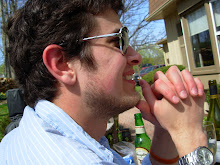
Yesterday I went downtown to the Free Library of Philadelphia to hear Jim Wallis speak about his new book called The Great Awakening: Reviving Faith & Politics in a Post-Religious Right America. To be honest, I actually wasn't looking forward to it all that much. I didn't know anything about Wallis or the books he'd written. But after hearing him, an evangelical Christian who teaches on faith and politics at Harvard on occasion, speak in politically neutral but passionately religious language about how it is up to us to bring revolution in the areas of poverty and other social justice issues, I was hooked.
He told a story about he a conversation he had had with Bono of U2 about the text of Luke 4:18, the first public appearance of Jesus in the synagogue. The text says this:
The scroll of the prophet Isaiah was handed to him. Unrolling it, he found the place where it is written:
"The Spirit of the Lord is on me, because he has anointed me to preach good news to the poor. He has sent me to proclaim freedom for the prisoners and recovery of sight for the blind, to release the oppressed, to proclaim the year of the Lord's favor."
Wallis didn't mention this but it is interesting that where Matthew has in his Beatitudes "Blessed are the poor in spirit, for theirs is the kingdom of heaven," Luke simply has, "Blessed are the poor."
Wallis's point? If it's not good news to the poor (the oppressed, the forgotten), then it's not the good news of Jesus Christ. I think evangelicals are finally grasping the significance of that statement. It seems like "those liberals" were onto something after all.





3 comments:
(Disclaimer I haven't read Jim Wallis' book, nor do I know his philosophies.)
I think politically, everyone wants to help the poor, but there is disagreement on how to do that. I personally disagree with the liberals method of doing it -- socialism. Taking other people's money to redistribute to those deemed to need it, does not work in our world. I think socialism would work in a perfect world. It is just abused in our fallen world.
I do not know what the answer is, except for politics to be out of the "providing" game. It's not the government's job to provide. It is the church / body of believers job to exhibit Christ-like character to help the poor and down-trodden. Handing out money to the poor only helps a few at the cost of many. (I feel taking a homeless person to dinner helps enable the person's homelessness and makes *me* feel good. But developing a relationship with someone that leads to solving their homelessness is a much better solution.)
My cynical viewpoint of politics is that talking about helping the poor does much more for keeping politicians in power, than it does for helping the poor. (After all, less poor people, means less power....) (Cynicism aside...)
The church can do (and it is required to do) so much more than any governmental body. If the government would stick to it's job of regulating inter-state commerce and protecting it's citizens, the church would have even more money to help the poor with.
So what is the place of faith in politics? I'm not sure yet.
Just my two cents,
Corey
I agree completely with you Corey. When I said "those liberals" I meant theological liberals not political. In the 1920s and beyond the theological liberal was one who considered the gospel to be social, about helping the less fortunate and the oppressed and didn't think doctrine about Christ mattered much. The gospel was spoken 'by' Christ but wasn't 'about' Christ. I agree with them on the fact that the gospel is about helping the downtrodden and the oppressed (something theological conservatives have been pretty crappy at the past several decades) but I don't agree that doctrines about Christ are therefore superfluous. Rather, I would argue for a high doctrine of Christ as the impetus for our social presence.
Interesting.
So was Jim Wallis' book about theological issues and not political (Sorry, I implied political because of the book title.)
Also, has the meaning of "theological liberals" changed since the 1920s similarly to the way it has changed politically?
Corey
Post a Comment